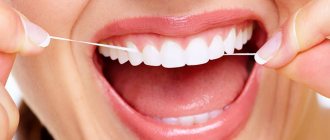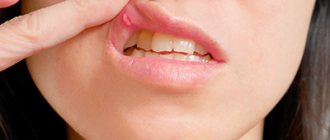The discomfort that occurs next to an interlocutor who has a problem with bad breath is familiar to everyone. The prevalence of this disease is extremely high: more than half of the world's population. Some clinical studies report a prevalence of 60% and even 80%. It would be a good reason to ignore the problem, because these are the majority! However, independent surveys have shown that almost 50% of respondents claim that bad breath significantly harms the successful career of its owner (especially if the professional activity is related to communication). 20% of respondents consider halitosis one of the most repulsive physiological “manifestations” of a human person (surveys were conducted in the UK). A person who has the problem of halitosis often does not even realize it, because he is adapted to his own smell. Humans, like other living beings, are evolutionarily programmed to pay attention primarily to unfamiliar, pungent and unpleasant odors. The sense of smell allows living beings to find food, find a sexual partner, receive sensory pleasure (for example, the smell of flowers or perfume), and also receive alarm signals (for example, spoiled food, dangerous chemicals). Knowing about the problem of bad breath, patients, as a rule, try to solve the problem on their own, turning to perfume, refreshing rinses, sprays, chewing gum, etc. However, these techniques only mask the unpleasant odor for a short period. A real solution to the problem can be achieved with the help of a specialist who will competently identify the causes of halitosis and select adequate treatment.
Bad breath - impairs understanding
Smells play, perhaps, one of the most important roles in our lives, which is very difficult to overestimate - under the influence of one or another smell, many likes and dislikes arise, although often we don’t even think about it. Bad breath (halitosis or halitosis) can thoroughly ruin a person’s life: they won’t hire him, they won’t want to continue getting to know him, work colleagues will try to turn away or move further away during a conversation... Unfortunately, most people are not even aware of the staleness of your breath - a person gets used to his own smell, gets used to it and cannot form an objective opinion about it. Only a few people can make a sensitive request to “test” their own breathing to a friend or loved one. If you suspect that your own breath is “stale”, you can try to do it yourself: take a small cotton swab, apply it to the middle part of your tongue and slightly moisten it. After this, the cotton roll can be assessed for the presence of an unpleasant odor.
Symptoms
If an unpleasant odor appears only in the morning and goes away after hygiene procedures, then this is the physiological nature of the occurrence of halitosis. This condition is considered normal and does not require any intervention other than regular hygienic cleaning. Attention should be paid to the chronic nature of the odor, which is most often accompanied by the following symptoms:
- Increased sensitivity, looseness and bleeding of gums;
- Tooth mobility and the presence of gum pockets;
- Plaque on the mucous membranes of the mouth;
- Darkening of the enamel along the gum ;
- Pain and swelling of the mucous membranes of the tongue.
In the absence of these symptoms, we can talk about an atypical manifestation and it is necessary to exclude the presence of internal diseases.
Close the door quickly...
Many sufferers of bad breath prefer not to mention it at all, even at a doctor's appointment, and rely on their own efforts to combat bad breath. However, these techniques only mask the unpleasant odor for a short period. A real solution to the problem can be achieved with the help of a specialist who will competently identify the causes of bad breath and select adequate treatment. To solve the problem of halitosis, you first need to consult a dentist. If the doctor does not find any pathologies in the oral cavity, and bad breath still bothers you, you need to look for another cause, and a general practitioner will help you with this and tell you which specialist you should see.
Sinusitis
Sinusitis is the general name for inflammatory processes occurring in the paranasal (paranasal) sinuses. The paranasal sinuses include: maxillary, sphenoid, frontal and cells of the ethmoid labyrinth. The maxillary sinuses are also called maxillary sinuses, and their inflammation is, accordingly, sinusitis.
Inflammation of the frontal sinuses is called frontitis, the sphenoid sinuses are called sphenoiditis, and the cells of the ethmoidal labyrinth are called ethmoiditis. The most common type of sinusitis is sinusitis.
Sinuses are air cavities in the skull that perform a number of important functions, for example, warming and humidifying inhaled air, reducing the weight of the skull, participating in the formation of the timbre of the voice, etc. Each sinus communicates with the nasal cavity through small openings - anastomoses, through which the nose The secretion produced in them is released from the sinuses. If bacteria become active in the sinuses, inflammation occurs. The orifices become swollen, narrowed or completely blocked, as a result of which mucous masses cannot exit into the nasal cavity. Mucus accumulates, mixes with waste products of bacteria, and pus is formed. It is the purulent masses that emit an unpleasant odor that is noticeable to others. It disappears immediately after proper treatment.
Treatment of sinusitis includes antibiotic therapy, washing the paranasal sinuses from purulent masses in the clinic and physiotherapeutic procedures.
Your mouth is under attack from germs!
Where does the unpleasant smell come from? Various microorganisms live in the nasopharynx and oral cavity; the list of them is quite impressive - more than 120 species. These microbes “nest” in pathological gum pockets, carious cavities, interdental spaces, nasopharyngeal mucus, secluded places in the tonsils and other “quiet pools.” This fact alone indicates that only careful and competent hygiene of the oral cavity (and the entire digestive tract along with the respiratory system) can control the situation with microbial “revelry”.
Diagnostics
Timely dental treatment is the key to not only oral health, but also the health of the body as a whole. Therefore, regular visits to the dentist will help cure diseases of the gums and teeth. If you detect even faint “aromas” of rotting, ammonia, hydrogen sulfide and mustiness, this is not normal and requires contacting a doctor. Get diagnostic tests if a white coating appears on your tongue.
Only a specialist can professionally determine the cause of the problem. Having assessed the tests, he will prescribe the correct therapy. Diagnosis usually begins with a thorough examination. If necessary, instrumental examination methods are prescribed. The patient may require detailed consultation with specialists such as a dentist, ENT doctor, gastroenterologist, endocrinologist. First of all, the dentist will determine the condition of the gum tissues, whether they are bleeding, or whether there is an increased vulnerability of the chewing organs.
If there is no apparent reason...
However, in some cases, the “runaway” of microbes has quite serious reasons - for example, a general weakening of the immune system. In such a situation, a person who has been suffering from halitosis for a long time needs the help of a doctor - perhaps, in order to eliminate the unpleasant odor, he will need to seriously improve the health of the stomach, tonsils, endocrine system, or operate on a deviated nasal septum - in general, there are many options. Chronic runny nose and pharyngitis are also often accompanied by the appearance of “stale breath,” which occurs due to the activity of bacteria that multiply on the mucous membrane. A similar mechanism is observed in diseases of the esophagus and stomach. The mechanism of occurrence of an unpleasant odor in this case does not differ from what occurs in diseases of the ENT organs. Other culprits of halitosis are medications: antihistamines, decongestants, antidepressants, anti-anxiety medications and hypertension medications reduce the flow of saliva, which increases the number of bacteria. Along with a slim figure, fans of diets also run the risk of acquiring an unpleasant odor. Two factors contribute to this: dry mouth and the release of medicinal-smelling acetone, which occurs when fat is burned in the body. If extra pounds interfere with your life, then when going on a diet, strengthen your control over your oral hygiene and drink as much fluid as possible. The smell of acetone can also appear with diabetes. If nitrogen metabolism is disturbed (most often with kidney disease), the smell of ammonia is noted.
Causes of bad breath
An unpleasant odor in exhaled air is usually caused by volatile sulfur compounds (hydrogen sulfide, methyl mercaptan, dimethyl disulfite, etc.). These types of compounds appear in the process of anaerobic breakdown of proteins (rotting), and accordingly the smell is often characterized as putrefactive. In more than 85% of cases, the causes of halitosis are found in the oral cavity. Bad breath often indicates dental problems.
The occurrence of persistent bad breath may be associated with somatic diseases, such as:
- diabetes,
- renal failure,
- pathology of the gastrointestinal tract,
- dysfunction of the liver and gallbladder,
- chronic and tumor diseases of the lungs.
With systemic pathologies, there is an increased release of metabolites through the lungs, which causes bad breath. Very often (up to 8% of cases) the cause of halitosis is diseases of the ENT organs (chronic sinusitis, rhinitis, tonsillitis). Other causes of halitosis include: smoking and other bad habits; periods of hormonal changes (menstrual cycle); specific diets and fasting; stress and nervous tension; use of certain medications. The occurrence of halitosis in the oral cavity is associated with the activity of gram-negative anaerobic microflora. Due to their anaerobic nature, these types of microorganisms live in places inaccessible to oxygen: deep inside the folds of the oral mucosa, in mature dental plaque, in microcracks in enamel and dentin tubules, and in the gingival groove. Bad breath is most associated with the presence of pathological periodontal pockets, carious cavities and plaque in the posterior third of the tongue. Most experts call reduced secretion of saliva a factor that enhances the manifestations of halitosis. For example, a decrease in the activity of the salivary glands at night is physiological, but this is the cause of “stagnant morning breathing.” If the level of salivation is insufficient, the natural cleaning of the oral cavity is disrupted, the most favorable conditions for the colonization of microorganisms are created, and local immunity is reduced. The cause of decreased salivation may be diseases of the salivary glands, taking medications, or mouth breathing. The presence of intraoral structures increases the number of difficult-to-clean areas of the oral cavity and, as a result, increases the risk of developing halitosis.
Do you talk a lot? Beware of halitosis
More often than others, halitosis affects workers of the so-called “conversational” genre - public politicians, lecturers, lawyers, radio show hosts... This happens due to the fact that during a conversation the oral cavity “dries out”, and active movements of the tongue help to “extract” the unpleasant odor from the most deeply hidden habitats of microbes. As you understand, in this case, neither candy nor chewing gum are helpful: diction suffers from them. And it’s not nice to chew or suck a pill during a performance. In this case, a traditional decanter of regular or mineral water will help.
Halitosis: treatment at home
Halitosis can be treated with traditional methods at home, but all procedures should be carried out after consultation with a doctor , and in the absence of serious health pathologies. The main direction of treatment is to remove pathogenic microflora. To do this, use herbal rinses:
- Chamomile;
- Oak bark;
- Sage.
Infusions should be warm, because... hot broth can burn your mouth and provoke the development of the disease. If fresh breath disappears due to hygiene or nutrition, then it is recommended to eat apples, carrots and pears, which gently remove plaque and massage the gums. Fresh herbs (parsley, mint, rosemary, basil) freshen your breath. Ginger root, which is finely chopped and consumed after meals, also helps well. It is important to make sure that you are not allergic to them before consuming any food.
Communicate with confidence!
Professional teeth cleaning
- Cost: 2,600 rub.
More details
So, if halitosis is your problem, the first step is to get professional advice. If bad breath has “far-reaching roots,” then measures to combat it can go quite far. If it turns out that the cause of halitosis is local, then your strategy will boil down only to regularly performed hygienic oral care. Namely, brushing your teeth at least twice. Despite the constant large-scale campaign calling for oral hygiene and advertising of toothpastes and flosses, many still do not know how to use them correctly. Instead of the three minutes it takes to completely clean all surfaces of the teeth, most of us spend barely more than 45 seconds on this procedure. Naturally, uncleaned teeth are almost not cleaned at all, since bacteria that are not eliminated from inaccessible areas quickly spread again over the entire surface of the tooth. You should also use a toothpick regularly. Food and bacteria between teeth and in bone defects can only be removed with a toothpick; leftover food contributes to your stale breath. Secondly, you need to rinse your mouth with water or special liquids after each meal. Gargling with water helps remove food particles left in the mouth after eating. Don't forget to brush your tongue. Bacteria left on the tongue can cause bad breath, so be sure to brush your tongue after brushing your teeth. Limit your consumption of coffee and tobacco. Do not forget about the prevention of “drying out” of the oral cavity, if this is provided for in your professional activity. The oral cavity should be moist. A dry mouth can also smell bad. Saliva helps clean your mouth; it contains a natural antibacterial composition that helps remove food debris. Try chewing sugarless gum or sugarless candy to stimulate saliva production. And, of course, periodically visit the dentist, whose meticulous examination will reveal all possible “problems” in your oral cavity. And at the same time, the specialist will tell you how to carry out all the above measures more correctly and safely in your specific case, taking into account the individual characteristics of the body. Let your breathing not be an obstacle to communication!
How to get rid of halitosis
1. You can restore fresh breath with medications. Popular remedies for halitosis are anti-inflammatory and antibacterial drugs. Serious diseases are treated with potent tablets, but halitosis is not one of them. You can get rid of it in safer ways.
2. Start with hygiene. Brush your teeth for at least 2 minutes twice a day. There are special antihalitosis toothpastes that contain additives with antimicrobial effects. Therapeutic and prophylactic agents restore the microflora, relieving the mucous membrane of dryness.









